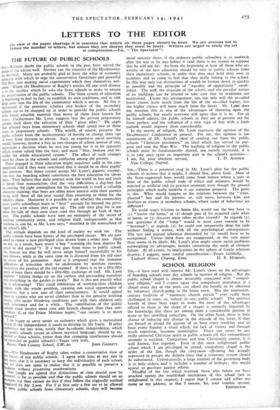Six— The Headmaster of Rugby takes rather a conservative view of
the future of our public schools. I agree with him, at any rate in the main, that it is necessary to keep the individuality of each school, but rye does not seem to realise that it is possible to 'preserve a
Nan without preserving anachronisms.
Most People are agreed that distinctions of class should now be ed as far as possible and that the public schools should set an InPle, but they cannot do this if they follow the niggardly method ested by Mr. Lyon. For if at first only a few are to be allowed enter public schools from elementary schools, they will become
social outcasts there, if the ordinary public schoolboy is as snobbish after the war as he was before it (and there is no reason to suppose that he will not be). So from the beginning at least all those who are worthy of the best education should be sent to public schools from their elementary schools, in order that they may hold their own in numbers and so come to feel that they really belong to the school. In this way only can distinctions of wealth be broken down as quickly as possible and the principle of " equality of opportunity " estab- lished. The staff, the situation of the school, and the peculiar nature of its buildings can be trusted to take care that its traditions are maintained. Under this arrangement, too, not only will the so-called lower classes learn much from the life of the so-called higher, but the higher classes will learn much from the lower. • Mr. Lyon does not mention this as one of the advantages of throwing open the public schools, but nearly everyone will agree that it is so. For as he himself admits, the public schools as they are at present are far from perfect, and the influence of a new type of boy with a fresh outlook would improve them considerably.
In the matter of religion, Mr. Lyon expresses the opinion of the Headmasters' Conference in general. For me, this opinion is too reminiscent of Dr. Arnold's ideal of sending out from the public schools " Christian gentlemen," an ideal which has served its pur- pose and won the Boer War. The teaching of religion in the public schools must be fundamentally altered, not merely increased, if it is to take once again an important part in the school's activities.—
I am, Sir, your obedient servant, T. D. ANDREW. New College, Oxford.






























 Previous page
Previous page